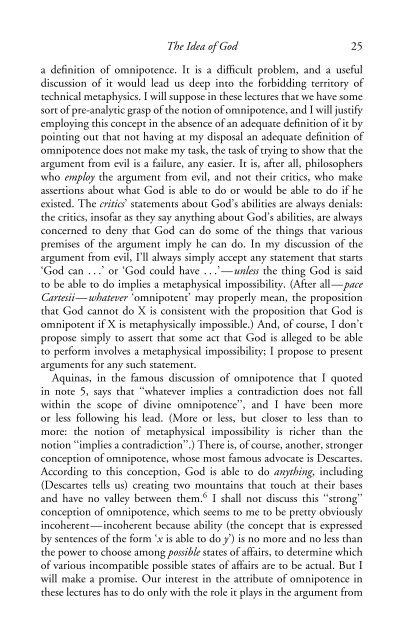The Problem of Evil - Common Sense Atheism
The Problem of Evil - Common Sense Atheism
The Problem of Evil - Common Sense Atheism
Create successful ePaper yourself
Turn your PDF publications into a flip-book with our unique Google optimized e-Paper software.
<strong>The</strong> Idea <strong>of</strong> God 25<br />
a definition <strong>of</strong> omnipotence. It is a difficult problem, and a useful<br />
discussion <strong>of</strong> it would lead us deep into the forbidding territory <strong>of</strong><br />
technical metaphysics. I will suppose in these lectures that we have some<br />
sort <strong>of</strong> pre-analytic grasp <strong>of</strong> the notion <strong>of</strong> omnipotence, and I will justify<br />
employing this concept in the absence <strong>of</strong> an adequate definition <strong>of</strong> it by<br />
pointing out that not having at my disposal an adequate definition <strong>of</strong><br />
omnipotence does not make my task, the task <strong>of</strong> trying to show that the<br />
argument from evil is a failure, any easier. It is, after all, philosophers<br />
who employ the argument from evil, and not their critics, who make<br />
assertions about what God is able to do or would be able to do if he<br />
existed. <strong>The</strong> critics’ statements about God’s abilities are always denials:<br />
the critics, ins<strong>of</strong>ar as they say anything about God’s abilities, are always<br />
concerned to deny that God can do some <strong>of</strong> the things that various<br />
premises <strong>of</strong> the argument imply he can do. In my discussion <strong>of</strong> the<br />
argument from evil, I’ll always simply accept any statement that starts<br />
‘God can ...’ or ‘God could have ...’—unless the thing God is said<br />
to be able to do implies a metaphysical impossibility. (After all—pace<br />
Cartesii—whatever ‘omnipotent’ may properly mean, the proposition<br />
that God cannot do X is consistent with the proposition that God is<br />
omnipotent if X is metaphysically impossible.) And, <strong>of</strong> course, I don’t<br />
propose simply to assert that some act that God is alleged to be able<br />
to perform involves a metaphysical impossibility; I propose to present<br />
arguments for any such statement.<br />
Aquinas, in the famous discussion <strong>of</strong> omnipotence that I quoted<br />
in note 5, says that ‘‘whatever implies a contradiction does not fall<br />
within the scope <strong>of</strong> divine omnipotence’’, and I have been more<br />
or less following his lead. (More or less, but closer to less than to<br />
more: the notion <strong>of</strong> metaphysical impossibility is richer than the<br />
notion ‘‘implies a contradiction’’.) <strong>The</strong>re is, <strong>of</strong> course, another, stronger<br />
conception <strong>of</strong> omnipotence, whose most famous advocate is Descartes.<br />
According to this conception, God is able to do anything, including<br />
(Descartes tells us) creating two mountains that touch at their bases<br />
and have no valley between them. 6 I shall not discuss this ‘‘strong’’<br />
conception <strong>of</strong> omnipotence, which seems to me to be pretty obviously<br />
incoherent—incoherent because ability (the concept that is expressed<br />
by sentences <strong>of</strong> the form ‘x is able to do y’) is no more and no less than<br />
the power to choose among possible states <strong>of</strong> affairs, to determine which<br />
<strong>of</strong> various incompatible possible states <strong>of</strong> affairs are to be actual. But I<br />
will make a promise. Our interest in the attribute <strong>of</strong> omnipotence in<br />
these lectures has to do only with the role it plays in the argument from
















